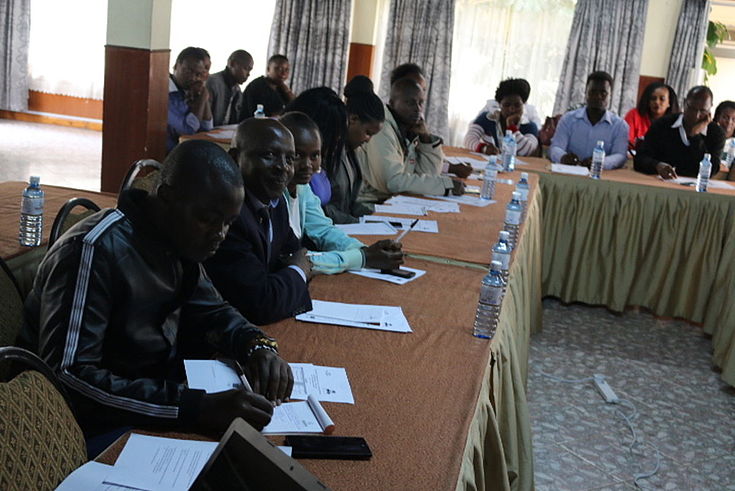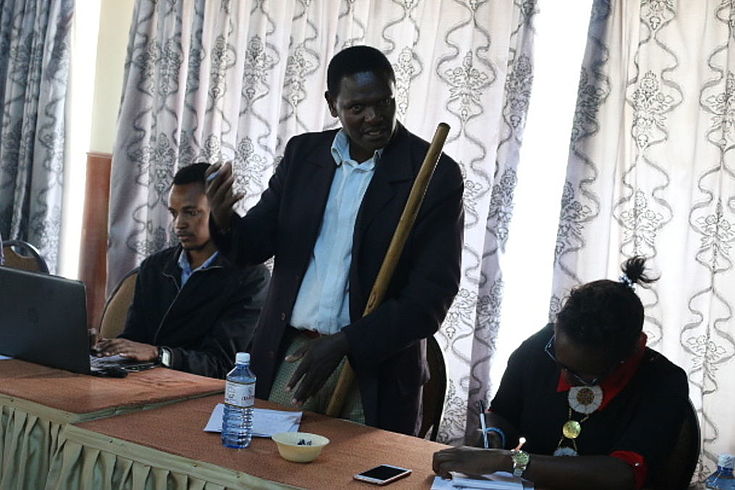Climate Change Mentorship Scheme
How can the climate change message reach grassroots communities?
Workshop participants representing different stakeholder organizations.
HSF Kenya
This formed the basis of a recent Climate Change Mentorship Workshop in Narok County, where the topics covered gave an overview of climate change mitigation and adaptation and how it is affecting different sectors of the economy in different countries. The mentorship training discussed the practicalities of disseminating information and knowledge on climate change to the grassroots.
The participants at the workshop, particularly those representing government agencies, were strongly encouraged and urged to be accountable in ensuring resources allocated for climate change related projects reached the grassroots community to prevent adverse impacts and losses. The participants made individual commitments to translate and share the knowledge and information gained during the conference in their personal and professional environments.
Some of these commitments included: to mentor young ladies to understand climate change issues, conduct further research within Narok, plant trees during important celebrations such as birthdays and anniversaries and to be more accountable, innovative and creative with climate change funds in the County.
Person With Disability (PWD) representative
HSF Kenya
There was a general observation in Narok of the enthusiasm by the County Government in understanding and tackling climate change issues through collaborations. The workshop concluded with the County Government officials deriving an action plan based on the group presentations such as developing polices to actualize the Narok County Environmental Act.
The workshop was organized by the Vision 2030 Delivery Secretariat with support from Hanns Seidel Foundation (HSF) on 17th -19th May 2018. The workshop was attended by representatives from the Narok County Government Departments of Environment and Natural Resources, Education and Health and Sanitation. Also, in attendance were stakeholders from other Organizations including National Environment Management Authority (NEMA), Kenya Water Towers Agency (KWTA), Maasai Mara University, Kenya National Chamber of Commerce and Industry (KNCCI), Kenya Forest Service (KFS), Mayian FM and Narok County Natural Resource Network.
HSF was represented by the Climate Change team, who also conducted visits to four sites including the Narok Water and Sewerage Company (NAWASCO), the Ewaso Ngiro Tannery and Leather Factory, African Medical Botanical Garden (AMBG) and a youth group referred to as Enkaina Naishooro which translates to ‘gifted hands’ located in an informal settlement area in Narok town.
HSF has been implementing this project in partnership with the Kenya Vision 2030 Delivery Secretariat on integrating climate change adaptation and mitigation measures into the Kenya Vision 2030 flagship development programmes since 2014. The project has worked with the County Governments of Uasin Gishu, Narok, Taita Taveta, Nakuru and Nyandarua. A diverse approach was taken to discuss rather complex topics such as climate change and what it means in relation to development. Notably, climate change will play a prominent role the Vision 2030 Medium Term Plan 3 (MTP3) as a stand-alone sector. The MTP 3 is set to be launched in August ensuing the launch of the County Integrated Development Plans (CIDPs).

Sylvia Lanyasunya
Project Officer Regional Sustainability Network

Carol Mungo
Project Assistant - Regional Sustainability Network


